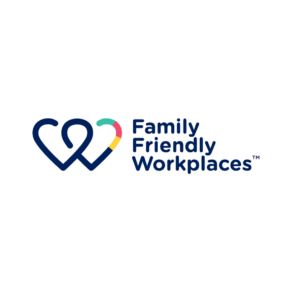The secret to remote working success: how Independent Living Fund Scotland has forged a flexible mindset
Published: 17 Jul 2025

Debate around flexible working can sometimes get stuck in a rut, and rigid thinking can often get in the way of success. Employers who understand the true value of a family-friendly, flexible approach aren’t concerned about how many days a week you may or may not work from home or the office, they understand that genuine flexible working is rooted in trust, autonomy and choice.
And no-one knows this more than Independent Living Fund Scotland (ILFS). Consistently one of Working Families’ Top Employers and having won the Best Practice Awards for Small Employer for two years running, they embody this attitude. Having always had agile workers due to the nature of their work, they decided to open up fully flexible working to all employees during the pandemic. We heard from Marianne and her manager Paul about the advantages of a people-first culture and how they have achieved it.
Meet people where they are
Putting people first is in the DNA of ILFS. Perhaps it’s no surprise, considering that they meet the needs of the disabled community, but they have decided to reflect this ‘life-friendly’ approach in their working practices. What this means in reality is that individuals co-design their work patterns so that personal and business needs are met. Finding the most suitable working pattern is seen as a collaborative approach – not a job done, but a work in progress; if something’s not working for you, we need to know and then pretty much every single discussion is on the table’ says Paul.
But for ILFS, flexible working goes beyond working arrangements, and instead is used as a tool to optimise a person’s abilities, as Paul explains:
We really listen to what people’s life goals and needs are, and build the work pattern, the work environment and in some cases the job, around the individual because we know if we get it right they can be invaluable to the success of our future.
Keep connected
For ILFS, who were used to working in an agile way, the transition into lockdown was seamless, as Paul describes, ‘it didn’t make a difference to us from a technical or operational perspective, but the big difference was the social perspective’. Many sceptics of remote working have doubts about maintaining a connection with colleagues. For ILFS, getting together as an organisation is important, and so they bring the entire staff team together for an away day twice a year for socialising and key updates. Informally, teams are encouraged to get together at least once a month, which helps to solidify relationships and provide opportunities to collaborate.
Build good foundations
The success of ILFS in creating a culture which is authentic and effective is that it is built on core values of trust, dignity and respect. Paul says if somebody’s telling us they need something, we listen to it. We believe them and we figure out a way of making it happen’. This ‘enabling culture’ means that people are empowered and trusted to work to the natural rhythm of their lives and their productivity. For Marianne, who is also a line manager, enabling someone to be responsive to what’s going on at home is obvious,
families come first, because otherwise you end up with somebody sitting at their desk, not able to concentrate on what they’re doing.
The ILFS approach is the opposite of presenteeism. Once trust enters the dynamic, you can be sure people are working with the best interests of both them and the business, as Paul sums up perfectly, ‘there’s a really big difference between a committed workforce and a compliant workforce’.
Choice and control over how a working life is designed begins at the recruitment stage, with adverts emphasising the flexible working offering. And crucially, managers are fully on board and demonstrate it’s the norm to be adaptable, and they receive training to effectively manage flexible teams.
Honour the whole person
Flexible working has been transformative for both Paul and Marianne, who says of her daughter ‘I’ve been able to be much more part of her life’. And as people’s lives evolve, so can their working arrangements; ‘My daughter is older now and doesn’t need me in the quite the same way, so I just had a quick chat with Paul, and we changed my working pattern’. But ILFS are quite clear that flex isn’t just there for immediate family – ‘we’re given permission to essentially map out who we have as our family’ – or indeed for caring responsibilities at all. As Paul explains,
it could be something you feel passionate about. For example, I really enjoy walking and cycling. Living on the far west of Scotland, the weather windows can be few and far between, so if I get a nice day, I make the most of it.
Have the discipline to disconnect
A common concern when it comes to remote working is the blurring of boundaries, which is something Paul and Marianne are well aware of. For Marianne, it means being vigilant in communicating with her team;
it does add an extra layer of responsibility on the manager because you have to consider whether there is anything that your direct report is saying that’s letting you know they haven’t got good boundaries.
And for Paul, it’s about acknowledging the difficulties,
I can be guilty of not switching off, I’m not very good at doing that because I think that part of my role is people trying to get hold of me at certain times, so I pretty much always have a work phone with me, but you have to be disciplined enough to disconnect.
Focus on mental fitness
For Paul and Marianne, the ILFS approach is inextricably linked to wellbeing. ‘In terms of mental wellness and fitness for work, working in a way that suits you and fits around your commitments means that you are able to focus and be your best while you’re at work.’ Having physical and mental space to reflect and increase sources of inspiration can also aid original thinking, as Marianne brilliantly identified:
Often people think that when their brain’s doing something that’s related to work it’s in neutral, but it’s not. I remember the time Paul said, ‘I’ve just been for a big, long walk and written the IT strategy’.
The business benefits
Their caring approach is recognised by ILFS as their strongest asset, and something they’re willing to invest in, having just hired a dedicated People and Culture lead. Being a small organisation with limited resources, their working policies and practices are a valuable tool, and it’s clearly paying off. Staff turnover is low (10% in the past year) and staff absence is consistently lower than the public sector average, despite 18% of the workforce having disabilities or underlying health conditions. Staff satisfaction is high, with 93% feeling valued, and on average 64% reported an improvement in both mental and physical health. Moreover 86% felt able to share work or personal issues with their manager and 100% reported the life-friendly approach being of value and working for them.
For ILFS, flexible working isn’t an add-on, but the bedrock to achieving a thriving workforce. Adopting flexible, supportive thinking has shaped their ways of working at every level to create a happier, more committed workforce, which not only has huge benefits for the business, but shows us all there’s a better way of working that works for all.

Employer Membership
A Working Families membership for employers will give you the tools, guides and policies you need to implement agile, flexible and family-friendly business practices.

Family Friendly Workplace Certification
Family Friendly Workplaces™ is a global movement to transform the future of work through family-friendly policies that support wellbeing, inclusion, and gender equality.